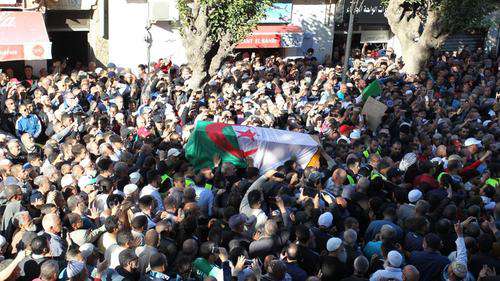
Al Qaeda reveals support for Qatar-based Algerian exile
Qatari support for extremists linked to terror organisations has pitched back into focus following the death of Abbassi Madani, the founder of Algeria’s Islamic Salvation Front (ISF) who has been praised by terror groups as an inspirational figure.
The north Africa branch of Al Qaeda issued a mourning statement for the 88-year old who was buried in an Algiers cemetery having died at his residence in Doha on April 24.
The Emir of Qatar, Sheikh Tamim had personally attended the Madani death prayer in the Qatari capital, where sources said the Islamist had been based for more that 15 years and had been paid $15,000 per month by the state. The body was then repatriated to his homeland where the burial took place.
Al Qaeda in the Islamic Maghreb (AQIM) is an off-shoot of the country’s decade long civil war that pitched Islamist forces against the country’s army. It is blamed by many Algerians for serial atrocities during the conflict as well as a continuing terror presence across the Sahara, including the 2012 uprising in Mali that forced the intervention of 5,000 French troops. The G5 coalition of forces in the African region continues to operate against AQIM to this day.
Most recently the Tunisian affiliate of AQIM was implicated in an attack on a border patrol in which six soldiers were killed in a landmine explosion.
The last significant attack in Algeria was in 2013 when Mokhtar Belmokhtar, the one-eyed Islamist leader masterminded an assault on an Algerian gas plant that left 37 foreign hostages dead.
The fallout from the military intervention after Algeria’s 1992 election saw the country plunged into conflict. The leader and co-founder of the FIS party sentenced him to 12 years in jail on charges of undermining state’s security. He was released in 1997 due to his health conditions but was placed under house arrest until the end of the imprisonment term in 2003.
He left Algeria in 2003 for Qatar and stayed there until he died. Years earlier he worked as a teacher in 1975-78 in London when Britain gave refuge to Islamist ideologues many of whom studied for advanced degrees at universities.
One eyewitness at the funeral on Saturday said that hundreds of “brothers of Algiers” are here but also noted that the crowd was not reflected of the youthful marchers who have demanded fresh faces at the head of government in recent weeks.
Algeria’s president of 20 years President Abdelaziz Bouteflika ended his tenure last month when demonstrators took a stand against his effort to secure a fifth term. With talks underway to ensure a transition of power, the funeral came at a sensitive time but the mostly middle aged mourners appeared to belong to another era.
According to the latest edition of the US military academy West Point’s Counter Terrorism Centre, AQIM retains its ambition to take power in Algeria, though it remains marginalised by the state security forces.
The stakes for most Algerians remain too high to return to that period of turmoil. “During terrorism’s worst years in Algeria from approximately 1993-1998, a period that Algerians refer to as “the Dark Decade,” more than 100,000 individuals were killed and thousands more traumatised by the ubiquitous violence,” wrote analyst Geoff Porter. “On March 10, 2019, al-Andalous Media, disseminated a tape of [Sheikh Abou Ubaidah Youcef Anabi] again trying to insert AQIM into Algerian events by encouraging demonstrators in Algiers and other cities not to give up and to cause the Algerian government to fall in order to allow for the implementation of Islamic governance.
“But Anabi’s encouragement seems to have fallen on deaf ears.”
Source: The National





